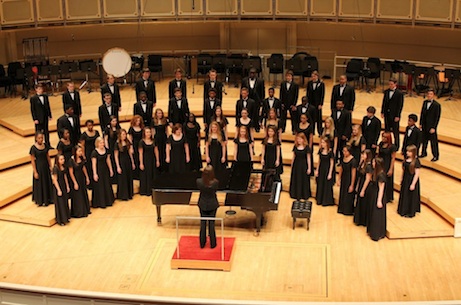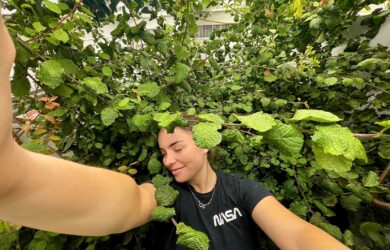
Erin Plisco was celebrating being selected for a Gates Cambridge Scholarship when she learnt her school choir had won a prestigious US choral singing competition.
Just as she was preparing to travel to Cambridge to take up her masters in choral studies, Erin Plisco found out that she and her high school choir had scooped one of the most prestigious choral singing prizes in the US – the American Prize.
The prize came three years after she started teaching at Pinecrest High School in North Carolina and marks a high point in her career in choral performance.
Erin [2013] comes from a family of music lovers. Her mother is a software engineer, but she started off as a music major in college and played a lot of piano when Erin was young. Her father graduated with a degree in music and performance and played the saxophone and clarinet. He is now in retail management.
Erin, who has a younger brother and older step siblings, learned to play the piano early, but was not that interested until fourth grade when she joined the school orchestra. She played the viola for a couple of years, but when she was around 14 she grew weary of orchestra class. A friend was in the choir and asked her to try it out. Immediately she was hooked. “It was the beginning of the end for me,” she says. In high school she had four years with an inspirational choir teacher which, she states, “changed my life”.
Erin, who was born in Newport News, Virginia, says she was not particularly studious at school in part because of family upheavals. She describes her teen years as turbulent. Her parents had divorced and she had moved around the US a few times, in part due to her stepfather’s military career.
“Choir music was an escape for me. It kept me connected and sane in my teenage years,” she says. Her high school had a strong arts programme, including a choir which performed at a high level and entered regional and state-level competitions around the US.
Leadership
She had not thought about studying choral music at university, but realised it was the only thing she really enjoyed. She was offered a few scholarships at nearby Christopher Newport University. She minored in Leadership Studies after being invited to apply as part of the scholarship programme. Her double major was in Choral Music and Vocal Performance. The programme was very varied and she says that at the time she did not realise how well her different majors and minor fit together since the leadership studies prepared her for teaching. During her time at university, she sang with various university choirs and with a professional choir in Virginia.
She also performed in operas. Her dedication to music meant there wasn’t much time for other activities. As her confidence grew, she started her own vocal ensemble with seven friends which performed in many different settings. She also directed a children’s choir, her first experience of teaching.
She opted to do her masters, also at Christopher Newport University, in teaching choral music and spent a six-week stint in a school teaching. “I wanted to stay involved with choral music and sharing the thing I loved with people on a daily basis was incredibly exciting,” she says, although she was not completely sold on the idea of teaching at the start.
After graduating, she found the job at Pinecrest High School in North Carolina. “I was really determined and applied to every opening in three states,” she says, adding that it is very difficult to get a high school post straight after graduation. She admits her first year was difficult as she didn’t feel confident, but by the second year she really embraced teaching and she describes her last two years as “incredible”. She worked with a variety of choirs in the school of varying ability levels, including people who had never sung before.
“There’s nothing like seeing your students get so excited about music like I was at high school. I wanted to make it an unforgettable experience for them,” she states. When she arrived she found that her students were all obsessed with Grammy award-winning composer Eric Whitacre so she invited him to the school for a big performance and says all the students were in tears at the end of it.
American Prize
In April she applied to enter the American Prize, with one of her choirs, a mixed group chamber ensemble. She submitted examples of their recent performances and in May learnt that they were semi-finalists. A month later they got through to the finals.
By this time Erin had already applied to Cambridge to do her masters in Choral Studies. She says it was the hardest decision she has made to leave her school, but she knew she wanted to pursue her studies. During her summer vacations she had taken part in choral workshops through the Yale Summer School and had sung in and conducted a professional choir. “I had a real battle with myself. I loved my students, but I wanted to better myself,” she says.
For the Gates Cambridge Scholarship she had to submit a recording of herself conducting and attend an interview in Washington. She says: “In the end life is short and it was too incredible an experience to turn down. I felt I was abandoning my students, but I realised that at any given point in my teaching career there would always be a group I was abandoning.”
She says her Cambridge course is perfect for her. She will be placed with different chapel choirs and will get the chance to conduct from her second term. At the same time she hopes to sing on the side. “After all, Cambridge is the mecca for choral singers,” she says.
*Erin is pictured with her former students performing on stage at Orchestra Hall in Chicago.












